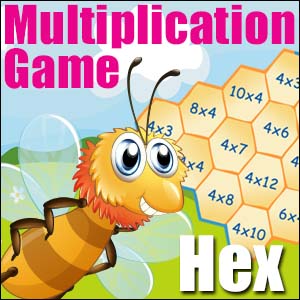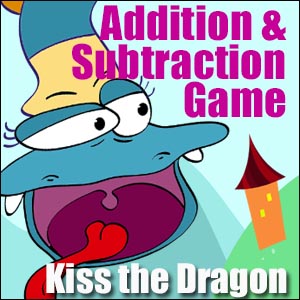4 by 4 Multiplication Game Board
Hex

Hex – 4 by 4 Multiplication Game Board – 2x Table to 12x Table
Hex is a two-player abstract strategy game with multiplication fact practice built into the gameplay. This download also includes a video game version for play on the smartboard.
What you need:
2 players
1 board
8 counters of one color
8 counters of another color
Aim:
For a player to make a continuous line of counters from one side of the board to the other.
How to Play:
1. Decide who is going first. This player plays across the board horizontally i.e. they are trying to make a continuous line of counters left to right.
2. Player 1 places a counter randomly on the board.
3. Player 2 then places a counter on any vacant hexagon in an attempt to block Player One’s progress. NB Player 2 is attempting to make a continuous line of counters from top to bottom of the board. between the orange sides of the board.
4. Players take turns placing counters until one player makes a continuous line.
How to Win:
The first player to create a line from left to right or top to bottom is declared the winner.
Items of Note:
1. Lines may twist and turn all over the board.
2. Corners can be claimed by either player.
Variation:
The Pie Rule – The second player may choose to swap sides after the second move if they wish.
Before the Game:
Whilst many students know 8×5 gives the same answer as 5×8, many are unable to represent these in concrete ways e.g. 5 flower pots with 8 flowers in each is very different from 8 flower pots with 5 flowers in each.
– How will you check if students have a thorough understanding of ‘groups of’?
– Do plenty of real-world examples to reinforce the relationship between the abstract and symbolic.
– Use junk mail to ‘go shopping’. Makeup algorithms and number stories from these.

Low Color Versions Included
After the Game:
– It has been mathematically proven the player who goes first has an advantage. How do you think mathematicians would work this out?
– Being able to swap numbers over and still get the same answer is known as the Commutative Law. Many people think it is important to know this law. Why might that be?
– Why might mathematicians have invented this name?
– Does the knowledge in this game stand up to the ‘So what!’ challenge? i.e. you just spent part of your life practicing this, where will you ever use it? NB Answers relating to money are the easy way out. What more have you got? hehehe
Strategy Experiments:
– The second player copies (mirrors) the first player’s moves. What effect does this have on the game? Test it out to see what happens. Could this be a useful strategy?
– Player 2 does a completely random move, to begin with, and then copies Player One’s moves.
– What if Player One notices Player Two is copying moves? Could a completely random move have an effect on the game’s outcome?
– It is said that this game cannot have a draw. Is this true? How might mathematicians work this out?
Included in this Download:
– 11 full-color boards
– 11 low color boards
– 1 PowerPoint version
– 1 VIDEO GAME version (Windows Only)
– 11 low color boards
– 1 PowerPoint version
– 1 VIDEO GAME version (Windows Only)
EXPLORE MORE




